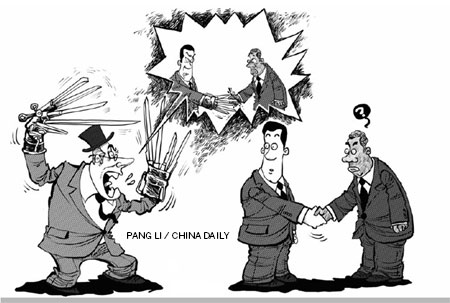Africa can choose its own friends
Updated: 2012-07-19 08:08
By Sehlare Makgetlaneng (China Daily)
|
|||||||||||

What is of paramount importance about Chinese companies in Africa are the way in which they operate and also the policies that they adopt in African countries. Do they have investment policies that are progressive? Do they invest in job creation? Are their investment policies and wages better than those offered by Western companies? In other words, we should judge Chinese companies on the basis of the material benefits they offer the local people in the countries where they operate and what they contribute to the economic growth, development and progress of African countries.
By constructing and rehabilitating roads, infrastructure, hospitals, clinics and telecommunication systems, Chinese companies have been creating wealth and employment opportunities for the local people and boosting national economies and improving national environments for the further development and progress of African countries. They have also contributed toward the integration of markets and Africa has gained from their role on the socioeconomic front.
China, through its investment, financial and trade relations with Africa, has also provided African countries with more leverage in negotiating better investment, financial and trade deals with Western companies. Thanks to Sino-Africa relations, Western companies and governments face intensified competition. This provides African countries with more room for maneuver in their relations with the West. They now have a solid alternative to accepting the dictates of the international financial institutions. China is Africa's ally in promoting a global system in which Africa's interests are no longer taken for granted.
Chinese companies are making goods available to Africans at prices that are relatively cheap compared with national and Western companies. While national and Western companies make goods available mainly to the middle and upper classes, Chinese companies make them available to the working class and the poor. Is it true that this is against a further development of the textile industry of African countries? What is immoral about poor Africans improving their material conditions by buying relatively cheaper goods?
China's strict illegal immigration management will not harm its ties with Africa. But China needs to have policy measures conducive for a qualitative improvement in relations between Chinese and Africans. It has to address genuine grievances Africans have relating to their treatment by Chinese citizens and authorities. The implementation of these measures will enable China to minimize the negative impact of illegal immigrants on its ties with Africa.
China's trade with Africa, characterized by manufactured products from China to Africa and raw materials from Africa to China, is not neo-colonialism. Instead, it reflects the development level of the manufacturing sector in Africa. Most African countries do not have a serious manufacturing sector. There is no evidence that China in its investment, financial and trade relations with Africa is trying to restrict the development and progress of the continent's own manufacturing sector.
The West's claim that China's relationship with Africa is neo-colonialism stems from its own policy toward Africa, which results from the fear its strategic interests will be harmed as a result of structural changes in African countries and China's growing presence on the continent. It camouflages the importance of these strategic interests by cloaking them behind concerns about Africa's security and development and the plight of the poor. According to this perspective, Africans are not capable of deciding for themselves who are their friends and who are their enemies.
By asserting that China is a new colonial power in Africa, the West has set itself up as the self-proclaimed guardian of the continent, it warns Africa to be careful and cautions it not to become an extension of China. Which is hypocritical, to say the least, coming from the countries that colonized and exploited Africa in the past. As the independence of their former colonies did not end their economic, financial, trade and technological domination in the post-colonial era, they are afraid that China's friendly relations with Africa pose a threat to their interests.
The West in its ties with Africa has assumed the role of a self-appointed world policeman with self-declared mission. It has also assumed paternity of Africans supportive of the principles guiding its policy of domination through divide and rule. It has become in the process, the police, judge, jury and executioner of Africans who are in theory and practice committed to the structural transformation of their continent. As long as it insists on playing the role of world policeman, the West will not respect the right of African countries to national self-determination and the free, independent exercise of their sovereignty and foreign policy.
Closer Sino-Africa ties constitute a historical opportunity for Africa. It is the responsibility of Africans to ensure that they contribute to their continent's qualitative political progress toward economic independence.
The author is chief research specialist and head of the governance and security program at the Africa Institute of South Africa in Pretoria, South Africa.
(China Daily 07/19/2012 page9)
Today's Top News
President Xi confident in recovery from quake
H7N9 update: 104 cases, 21 deaths
Telecom workers restore links
Coal mine blast kills 18 in Jilin
Intl scholarship puts China on the map
More bird flu patients discharged
Gold loses sheen, but still a safe bet
US 'turns blind eye to human rights'
Hot Topics
Lunar probe , China growth forecasts, Emission rules get tougher, China seen through 'colored lens', International board,
Editor's Picks

|

|

|

|

|

|





